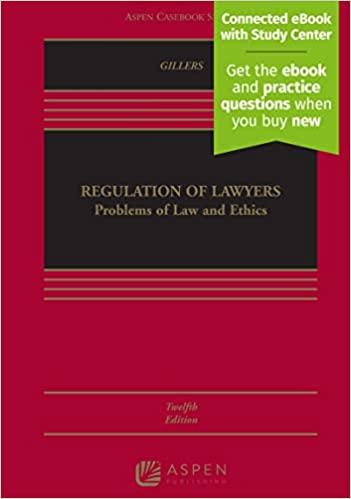Question
RESPOND TO YOUR CLASSMATES POST: Under the case of Gideon v. Wainright, the Civil Gideon rights may be applied as it has been introduced in
RESPOND TO YOUR CLASSMATES POST:
Under the case of Gideon v. Wainright, the Civil Gideon rights may be applied as it has been introduced in the court system under the constitution of the United States. The concepts of the Civil Gideon rights have been applied to previous cases relegated to property damage. Before expressing further, we can take a moment to outline the concepts of Civil Gideon, which have been identified U.S. Constitution.
The case of Schroeder v. Hundley, as a reference, the concept of Civil Gideon has been annotated as "Presently before the Court is Defendant Jason Chappell's Motion to RequestCivilGideon Rights ("Mot.," ECF No. 76), which the Court construes as a motion to appoint counsel according to28 U.S.C. 1915(e)(1)
The Motion indicates that Mr. Chappell is "unemployed" and "ha[s] no assets that [he] can liquidate" to pay an attorney to represent him, and accordingly, Mr. Chappell requests the Court to appoint counsel "[i]n accord with [his] CivilGideon Rights." From this indication, we can understand that Civil Gideon can be understood as the rights the constitution grants to the people who cannot afford to hire an attorney for their civil cases.
In addition, the rights of the Civil Gideon system still exist in our court systems. It is understood that both federal and state court systems are obligated in some cases to grant the defendant the right to counsel who may represent him/her during the litigations. Many clauses have identified how the Civil Gideon system works under the constitution. Furthermore, we can look at the citation from the research under the Westlaw.
Based on the research under the source of Westlaw, we have learned that the Court is only empowered to exercise that discretion if the litigant is "unable to afford counsel," 28 U.S.C. 1915(e)(1)("The court may request an attorney to represent any personunable to afford counsel.") (emphasis added). "When a claim of poverty is made undersection 1915, 'it is proper and indeed essential for the supporting affidavits to state the facts as to affiant's poverty with some particularity, definiteness, and certainty.' "United States v. McQuade, 647 F.2d 938, 940 (9th Cor. 1981)(quotingJefferson v. United States, 277 F.2d 723, 725 (9th Cor. 1960)).
Nevertheless, the expressions above are enough to determine my opinion on whether all people are to be represented by attorneys or not. Civil Gideon right is not designed to have every single person represented by attorneys in the court. It can be specified and determined by the court who is eligible to be represented by the attorneys during the ligation process. Therefore, I firmly stand against the statement that attorneys should not represent all people. There should be alternative ways other than having attorney's representation. For example, the defendant may prepare, file, and serve a pleading and legal memorandum, gather evidence that may be used during the trial; and have a witness(s) who may testify on your behalf.
In the end, we learned that the Department of Justice (DOD) outlined in the brief that "The Department of Justice filed an amicus curiae brief late yesterday in the Supreme Court of Idaho inTracy Tucker et al. v. State of Idaho, et al. The brief articulates the United States' position that criminal defendants who cannot afford an attorney may bring a future civil lawsuit to prevent violations of their constitutional right to counsel under the Sixth Amendment rather than waiting to bring claims following a conviction that resulted from inadequate representation."
Lastly, the brief under the DOD continued to articulate that "The department's brief focuses on the importance of such prospectivecivilclaims to uphold the right to counsel and to ensure that states comply with the Supreme Court's ruling inGideonv. Wainwright, which held that all persons are entitled to a lawyer even if they are too poor to pay for one."
References:
Putman, W.H. & Albright, J. (2018).Legal research, analysis, and writing (4th Ed.). Cengage Learning.
Westlaw:
Gideon v. Wainright, Supreme Court of the United StatesMarch 18, 1963,372 U.S. 33583 S.Ct. 792
Step by Step Solution
There are 3 Steps involved in it
Step: 1

Get Instant Access to Expert-Tailored Solutions
See step-by-step solutions with expert insights and AI powered tools for academic success
Step: 2

Step: 3

Ace Your Homework with AI
Get the answers you need in no time with our AI-driven, step-by-step assistance
Get Started


